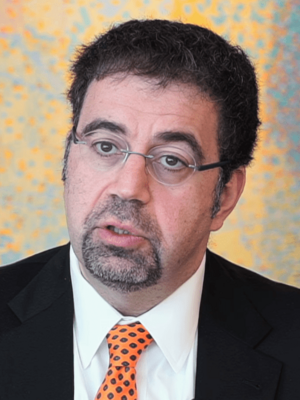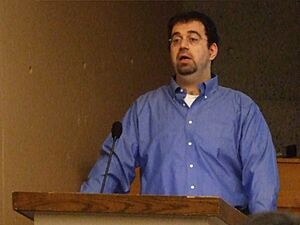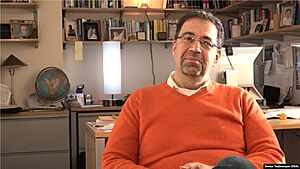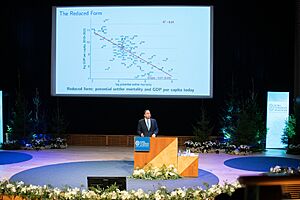Daron Acemoglu facts for kids
Quick facts for kids
Daron Acemoglu
|
|
|---|---|

Acemoglu in 2016
|
|
| Born |
Kamer Daron Acemoğlu
September 3, 1967 Istanbul, Turkey
|
| Citizenship | Turkey and United States |
| Spouse(s) | Asu Ozdaglar |
| Institution |
|
| Field | Political economy Economic growth Development economics Labour economics |
| School or tradition |
New institutional economics |
| Doctoral advisor |
Kevin W. S. Roberts |
| Doctoral students |
Robert Shimer • Mark Aguiar • Pol Antràs • Gabriel Carroll • Melissa Dell • Benjamin Jones • Ufuk Akcigit |
| Influences | Joel Mokyr • Kenneth Sokoloff • Douglass North • Seymour Martin Lipset • Barrington Moore |
| Awards |
|
| Information at IDEAS / RePEc | |
Kamer Daron Acemoğlu (born September 3, 1967) is a famous Turkish-American economist. He has taught at the Massachusetts Institute of Technology (MIT) since 1993. At MIT, he is a top professor of economics. In 2019, he became an Institute Professor, which is the highest honor for a faculty member at MIT.
Acemoglu won the John Bates Clark Medal in 2005. This award is given to an American economist under 40 who has made a big impact. In 2024, he received the Nobel Prize in Economics. He shared this prize with James A. Robinson and Simon Johnson. They won for their studies on why some countries become rich and others stay poor.
Many economists think highly of Acemoglu. In 2015, he was named the most cited economist of the past 10 years. This means his work is often referenced by other economists.
Early Life and Education
Kamer Daron Acemoğlu was born in Istanbul, Turkey, on September 3, 1967. His parents were Armenian. His father, Kevork Acemoglu, was a lawyer and teacher. His mother, Irma Acemoglu, was a poet and a school principal. Daron went to an Armenian elementary school and then to Galatasaray High School. He became interested in politics and economics when he was a teenager.
He studied economics at the University of York in England, getting his first degree in 1989. Then, he went to the London School of Economics (LSE). There, he earned a master's degree in 1990 and a PhD in economics in 1992. He was only 25 when he got his PhD, which is very young for such a high degree.
Acemoglu is now a US citizen. He speaks English and Turkish fluently, and some Armenian. He is married to Asuman "Asu" Ozdağlar, who is also a professor at MIT. They have written several articles together. They live in Newton, Massachusetts, with their two sons.
Academic Career and Research
Daron Acemoglu started teaching at the London School of Economics in 1992. In 1993, he joined MIT as an assistant professor. He quickly moved up the ranks, becoming a full professor in 2000. In 2010, he became the Elizabeth and James Killian Professor of Economics. This is a very important position at MIT. In 2019, he received the highest faculty honor at MIT, becoming an Institute Professor.
He has guided many PhD students, helping them with their research. Acemoglu is also part of the National Bureau of Economic Research (NBER). He has written hundreds of academic papers. He says that much of his work tries to understand why some countries are poor. His research covers many topics, like how politics affects the economy, economic growth, and how people's skills and jobs impact the economy.
Acemoglu often works with James A. Robinson, a political scientist. They have written many articles and books together, mostly about economic growth and development. They also work with economist Simon Johnson.
Key Research and Books
Acemoglu is known for his work in "new institutional economics." This field looks at how rules, laws, and customs (institutions) affect how economies work.
Understanding Democracy and Growth
Economic Origins of Dictatorship and Democracy
In 2006, Acemoglu and James Robinson wrote Economic Origins of Dictatorship and Democracy. This book explores how democratic societies are created and how they stay strong. They argue that democracy lasts when powerful groups don't have a strong reason to overthrow it. This depends on things like how strong society is, how political systems are set up, and how much economic inequality there is. Many experts praised this book as a very important contribution to understanding democracy.
Why Nations Fail

Acemoglu and Robinson's 2012 book, Why Nations Fail, became very popular. It explains why some countries are rich and others are poor. They argue that the main reason is a country's political and economic institutions. They say that countries with "inclusive institutions" (where many people can participate in the economy and politics) tend to be rich. Countries with "extractive institutions" (where power and wealth are held by a small group) tend to be poor.
They believe that things like culture, weather, or geography are not the main reasons for a country's wealth. For example, they explain that the Industrial Revolution started in Great Britain because its laws allowed for new ideas and businesses to grow. The book was written for everyone, not just economists, and sparked a lot of discussion.
The Narrow Corridor
In their 2019 book, The Narrow Corridor. States, Societies, and the Fate of Liberty, Acemoglu and Robinson discuss how a free society comes about. They suggest that freedom happens when the power of the government and the power of the people are balanced.
Power and Progress
Acemoglu and Simon Johnson published Power and Progress: Our Thousand-Year Struggle Over Technology and Prosperity in 2023. This book looks at how technology has developed throughout history and its effects on society. They question whether new technologies always benefit everyone. They argue that sometimes, the benefits of technology go to only a small, powerful group.
The book also talks about artificial intelligence (AI). They suggest that AI might have negative effects on jobs and wages. They also offer ideas on how technology can be used for the good of society.
Important Research Papers
Social Programs and Policies
Acemoglu has researched how things like the minimum wage and unemployment benefits affect jobs. He has suggested that these policies can help create more high-wage jobs and improve overall productivity.
Democracy and Economy
In their research, Acemoglu and his colleagues found that democracy generally helps a country's economy grow. They estimated that becoming a democracy can increase a country's wealth per person by about 20% over time.
Colonialism's Lasting Impact
One of Acemoglu's most famous papers, "The Colonial Origins of Comparative Development" (2001), was written with Robinson and Johnson. They argue that European colonizers set up different types of institutions in their colonies. In places where Europeans settled in large numbers, they created institutions that supported economic growth. In places where they didn't settle much, they set up "extractive institutions" to take resources. These extractive institutions often continued even after the colonies became independent, leading to lasting poverty.
Views and Opinions
Acemoglu is often described as a "centrist" economist. This means his views are generally in the middle, not leaning too far left or right. He believes that a market economy is the best way to create wealth. However, he also thinks that markets need rules and laws to work well. He supports finding a balance between encouraging new ideas and hard work, and providing important public services and equal opportunities.
- Wall Street and Inequality
Acemoglu has criticized the lack of rules in the financial sector, especially on Wall Street. He believes that too much focus on profit without proper rules can lead to problems like the 2008 financial crisis. He also worries about increasing inequality in the US. He thinks that when some people have too much money, it can lead to political inequality, where the rich have more power. He supports ways to increase social mobility, so that people from all backgrounds have a chance to succeed.
- Social Democracy and Unions
Acemoglu has spoken in favor of social democracy. He believes that social democratic systems, like those in Scandinavian countries, have been very successful. He argues that they help protect workers and encourage job creation and good wages. He also believes that strong labor unions have played a role in creating democracy and balancing power.
- Donald Trump
Acemoglu has compared some of President Donald Trump's actions to those of leaders in authoritarian countries. He has expressed concern that Trump's approach could risk US democracy.
- Authoritarian Countries
Acemoglu believes that authoritarian governments face challenges in achieving long-term economic growth. He argues that they often stop new ideas from developing and can be unstable. He has commented on countries like China and Russia, suggesting their growth might not last without more open institutions.
- Turkey
Acemoglu has criticized the Turkish government for its authoritarian rule. He believes that Turkey's path away from democracy is concerning. He has also spoken out against anti-Armenian messages in Turkish textbooks.
- Armenia
Acemoglu has shown interest in Armenia's economic and political development. He believes that Armenia's main problems are political, not due to its geography or culture. He has encouraged the Armenian government to be more responsive to its citizens. He has also criticized the Armenian diaspora for supporting governments that violate citizens' rights.
Recognition and Awards
Daron Acemoglu is one of the most respected economists in the world. His work has been cited by other researchers hundreds of thousands of times. He was listed among the "Top 100 Global Thinkers" by Foreign Policy magazine in 2010.
Many experts have praised his work. Francis Fukuyama called him one of the "world's leading experts on development."
Major Awards
- John Bates Clark Medal (2005): This is a very important award for young economists.
- Erwin Plein Nemmers Prize in Economics (2012): Awarded for his important work on political institutions and economic growth.
- BBVA Foundation Frontiers of Knowledge Award (2016): Recognized for showing how institutions affect economic development.
- Nobel Memorial Prize in Economic Sciences (2024): He shared this prestigious award with James A. Robinson and Simon Johnson. They were honored for their studies on how political and economic institutions shape a nation's wealth. Acemoglu became the second person of Armenian descent and third Turkish national to win a Nobel Prize.
Acemoglu has also received honorary degrees from many universities around the world.
See also
 In Spanish: Daron Acemoğlu para niños
In Spanish: Daron Acemoğlu para niños
 | Sharif Bey |
 | Hale Woodruff |
 | Richmond Barthé |
 | Purvis Young |




